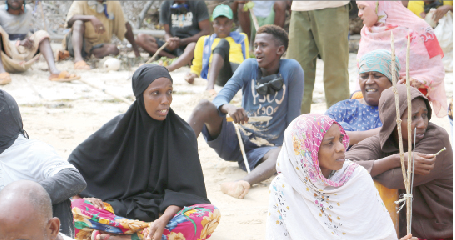Lamu woman dares deep sea to turn her family’s economic tide
By People.Reporter, June 20, 2022The Lamu archipelago is well known for its longest established and best-preserved traditional Swahili settlement in Kenya. Foreigners and locals travel to this calm side of the country to enjoy its sandy beaches and exquisite Swahili cuisines.
But while most of the visitors and some residents enjoy their sweet sleep at dawn, you will find a number of women including Amina Juba popularly known as Mama Pweza in the ocean doing what has been considered masculine for years—fishing.
For decades, fishing has been considered a “manly” job and only a fraction of women not only in Kenya, but the entire region dared to venture, may be due to the risks involved.
However, for few years now, Mama Pweza and her fellow women at Pate Island are breaking the norms by venturing into commercial fishing and aside from changing the industry perceptions, the economic impact in their households is evident.
Previously, the few women who fished did so strictly for domestic purposes and utilised every fish caught for home usage. They never went deep into the ocean and only fished at the shores of the ocean since their demand was low.
But today, more than 50 million women are involved in fisheries and aquaculture around the world and their contribution to household incomes and communities cannot be overlooked.
And in Lamu, Mama Pweza is among the 137 pioneering women of Pate who beat the culture to ride a boat every morning to fish.
Rising against all odds
Mama Pweza shares how in 2017, her husband who was the sole provider left her and their five children. With no source of income, life was unbearable for the family and they really struggled to put food on the table.
“I struggled to feed my children and paying school fees for them. We lived from hand to mouth as I thought my husband would eventually come back,” she says.
However, after a long wait, she chose to stop the pity-party, turn around her miseries and be a provider her children expected her to be. The only available work in the island was fishing.
“We came together as a group of women and our initial plan was to just fish. But we realised we could actually fish and sell the commodity, and that is how we took the challenge,” she says.
At first, it was difficult for the men to accept women going to the deep seas. Also, fishing takes place during the night or at dawn and it was a challenge for her as a woman to leave her children behind and go fishing.
“We also did not have fishing boats and we had to accompany men or wait until they came back, then use their boats,” she notes.
However, their persistence in the fishing industry forced the men to change their mindset and embrace them and with time, they allowed them to use their boats and gave them any assistance they required during the operations.
Their efforts attracted the attention of fishing stakeholders including the County government of Lamu and non-governmental organisations who came to their aid by providing two fishing boats to the women’s group.
Mama Pweza says the stakeholders further educated them on best fishing practices.
“We also travelled to Madagascar where we met our fellow women doing great in the industry and learnt how women are involved in fishing. The trip changed my perspective on fishing and I started thinking on how I could commercialize it,” she says.
Beyond the horizon
And once back in Lamu, she started implementing the fishing plans such as zoning of fishing areas, while at the same time strategising how to go about the business.
However, her dream had to be put on hold after facing myriad of challenges. “The Island was not connected to electricity, therefore there were no means of storing fish. Whatever we fished, we had to sell it immediately and domestically use the remaining ones, “she notes.
However, in September 2021, the Island was connected to the much needed electricity grid, which in return opened it to wider range of opportunities.
For Mama Pweza, she was finally able to set up her fish selling shop where she buys fish from other fishers and sell to major buyers from Lamu town and beyond as she has adequate storage capacity.
She, however, faces challenges, which she says are out of her control such as phone network and transport challenges.
Due to unstable cellphone network, Mama Pweza says she misses a lot of calls from her customer, maybe calling her to make orders for her commodity.
She, however, says she has curved a niche for herself, earning loyalty from her customers who are patient with the network problems she experiences.
“We also depend on boat transport and when the tides are too high, the boat cannot ride meaning my cargo cannot be ferried to Mokowe, Manda or Lamu. So I end up having stock of fish, which sometimes gets spoilt,”she notes
Marketing is carried out basically by word of mouth and through clients she previously served. “I have clients in Mombasa and Nairobi. I package fish and transport through a bus or flight, whichever way the client wants,” she notes.
Through this venture that started due to lack of income, Mama Pweza has been able to turn around the economic fortunes of her home.
“I have been able to educate my children, I have a beautiful house and my children wear decent clothing as a result of this fishing business,” she says.
And while she leads other women to financial independence in her area, her ultimate dream is to expand her fish supply business and storage facilities in other key areas such as Lamu town.
